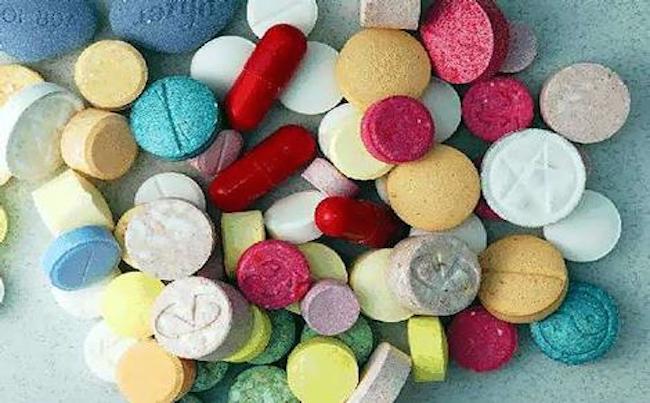
Party drugs (Photo grabbed from google)
As the Christmas celebration and Sinulog Festival revelry draw near, the Police Regional Office in Central Visayas (PRO-7) and the Philippine Drug Enforcement Agency (PDEA) in the region cautioned the people about the use of “party drugs.”
Even though they have not monitored big transactions of party drugs in the region, the regional directors of the two law enforcement agencies said they could not disregard the possibility that these drugs could enter the Cebu party market, just like in many big metropolis in the world, like Metro Manila.
PDEA-7 Director Emerson Margate said it is likely that the prohibited substance would be transported to and used in Cebu, the country’s biggest metropolitan area next to those in the National Capital Region.
Chief Supt. Jose Mario Espino, the director of PRO-7, likewise pointed out that they need to remain vigilant and take a close look at Cebu’s party scene, as there is a big possibility that there will be party drugs, especially with events happening all over Metro Cebu in the run up to the Christmas celebration that extends all the way to the Sinulog Festival, a religious feast in honor of the Sto. Niño (Child Jesus) but has evolved in a fiesta-like festivity staged every third week of January, which will culminate in a mardi gras like dance parade on the third Sunday of the month.
“(Party drugs) that is one of our concentrations this coming Christmas season,” Espino said.
‘Fly high’
According to a report from the PDEA, the commonly distributed party drug as of 2012 was ecstacy (methylenedioxymethamphetamine), which were commonly used in parties.
This time however, aside from ecstacy, the party drug of choice is a mixture of shabu (crystal meth), ecstacy and viagra that are meant to heighten the senses, especially sexual urges, according to Leia Albiar, PDEA-7 spokesperson.
This combination is also called “fly high,” said Albiar, and are used to spike alcoholic drinks.
Recently, the public’s attention was drawn into the use of party drugs after PDEA agents broke up a sexual orgy and drug session at an upscale hotel in Bonifacio Global City, Taguig, on November 26, arresting 11 men, among them a doctor, an engineer and two models.
Seized during the operation were P387,000 worth of illegal drugs, including 40 tablets of ecstasy, two sachets of suspected crystal meth and 14 bottles of gamma hydroxybutyrate or GHB with a total weight of one liter.
PDEA Director General Aaron Aquino had said the group was planning to do a PNP or “party and play” and ChemRom or “chemical romance,” slang for mixing drugs to spike sexual satisfaction.
GHB, more popularly known as “liquid ecstacy,” “G” or “water,” was a drug used by young people at bars and rave parties. Often mixed with alcoholic drinks, its reported effects are euphoria, increased sex drive and tranquility, according to Aquino.
Prepared for big parties
In Cebu, Both PRO-7 and PDEA-7 are taking measures to ensure that these party drugs will not proliferate in the region, especially during big events.
Margate said that usually if there are big parties to be conducted, they would receive request letters coming from the organizers and the concerned local government unit.
“On our part, if there are big activities, we initiate a surveillance operation because we usually anticipate that there is a demand for party drugs,” Margate said partly in Tagalog.
He added that they conduct pro-active measures, like intense monitoring on the activities.
Margate said they were aware that there is a demand for party drugs in Cebu but not in the same scale as that in Metro Manila.
Last August, PDEA-7 agents had taken photos and videos of drug transactions in at least five clubs in the cities of Cebu and Mandaue.
Then PDEA-7 Director Yogi Felimon Ruiz showed to the media photos and videos taken by undercover agents inside these clubs.
They showed drug peddlers handing over packs of shabu or ecstasy to buyers inside the clubs, which are all now still being monitored by the agency.
Priority
Once the Philippine National Police (PNP) can officially engage in the war on drugs again, Espino said that the party drugs would be on top of their target list.
“Once we are fully reactivated, our DEU (drug enforcement unit), this will be one of our priorities,” Espino said.
He said the PRO-7 has received some reports on these party drugs circulated in Cebu but not as big as the transaction of shabu.
“Good thing that we are back in our campaign (against illegal drugs). We could operate (on these party drugs),” Espino added.
Margate said it would be harder for illegal drug players, including the distributors of party drugs, to sneak in narcotics in the ports of Cebu after PDEA-7 has been given access to port terminals to conduct inspections.
He said PDEA-7 agents have to be more vigorous in the anti-drug campaign as they need to reduce the supply of all types of illegal drugs entering Cebu, not just the party drugs.
He said they would start inspecting ports since illegal drugs could now be easily transported through the ports rather than in airports.
“It was a good thing that the new director of the Bureau of Customs (BOC) was the former director general of PDEA (Isidro Lapena),” Margate said, of the strengthened ties between PDEA and BOC.
As for the police, Espino urged the restaurant and bar owners to coordinate with law enforcement units if they have any knowledge of transactions of this kind of drug.
“They (owners) should help and report whatever they have kind of information on the circulation of party drugs on their establishments,” Espino said.
Espino warned that if there are establishments that would not coordinate and cooperate with them, then the police would have no choice but to go after after these establishments.